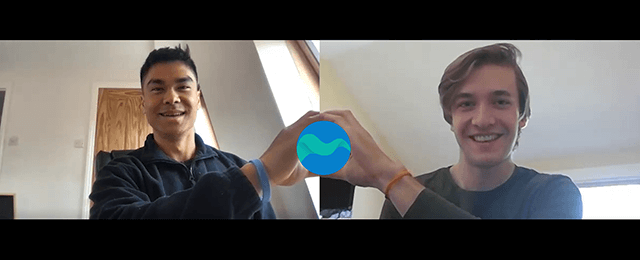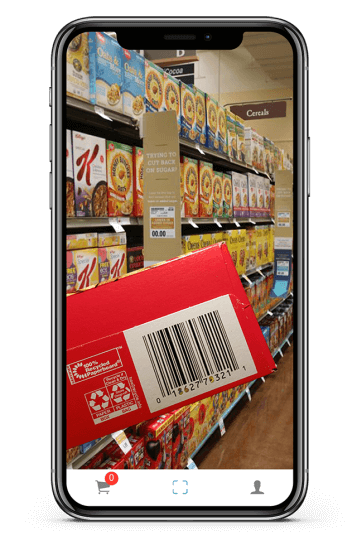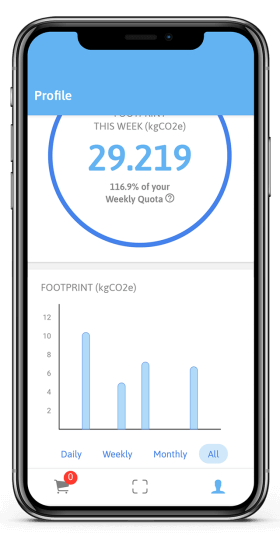News
Marble co-founders Chris Tan (left) and Blake Bullwinkel. All illustrations by @businessfrog
The average supermarket has about 30,000 items on its shelves, so discerning shoppers are awash in a sea of choices—organic vegetables, artisanal cheeses, grass-fed meats, fair-trade coffee.
But what if shoppers want to purchase foods that minimize their impact on the environment? Information on a product’s carbon footprint typically can’t be found on its label.
Enter Marble, a startup co-founded by a Harvard graduate student that enables shoppers to scan a food product’s barcode with their smartphone and see an estimate of that item’s carbon footprint (in kilograms of CO2).
Users scan the bar code of a grocery item to add it to their Marble cart. All illustrations by @businessfrog
Users add items to the shopping cart in Marble, which computes the total carbon footprint of their groceries and enables them to track and visualize the environmental impact of purchases by category, brand, and over time, explained Blake Bullwinkel, S.M. ’22, who is enrolled in the master’s in data science program, administered by the Institute for Applied Computational Science at the John A. Paulson School of Engineering and Applied Sciences.
“Like many people, we feel a strong desire to address climate change, and that starts with understanding and quantifying our impact on the environment. But we realized that there is nothing out there that makes it easy to do that,” said Bullwinkel, who co-founded Marble with his friend Chris Tan, a computer science student at University College London.
“We believe that giving people access to their own environmental data is an important first step towards empowering them to understand, track, and minimize their negative impact,” Tan explained.
“But it’s not just about forcing consumers to change,” added Bullwinkel. “Ultimately, climate change is a huge problem that won’t be solved without leadership from large corporations, including food manufacturers. We believe that just as regulations in the 90s required them to publish nutrition facts on standardized and easy-to-interpret labels, companies should be required to include environmental facts on product packaging.”
The Marble app is powered by an AI algorithm that estimates the carbon emissions generated by the creation of a specific grocery item, Tan said. The algorithm incorporates data on CO2 generated from producing raw ingredients, the item’s manufacturing process, and its transportation to the supermarket.
Some estimates are more accurate than others, based on the availability of information on ingredients and production processes. The goal is to make the carbon footprint estimates specific enough to help a user understand the difference, for example, between purchasing oat milk and dairy milk, Bullwinkel said.
“For instance, if someone has been thinking about going vegan, being able to see that their meat consumption is a huge portion of their carbon footprint could be a huge personal incentive to make the switch,” Tan said.
Marble users can see detailed information on the environmental impact of purchases by category, brand, and over time. All illustrations by @businessfrog
Developing the algorithm has been the biggest challenge for Tan and Bullwinkel, since there is no large online database of carbon footprint information for food products they could use to train it.
They’ve had to get creative by combining information from different sources to generate estimates. As they incorporate more data into the algorithm, the accuracy will continue to improve, Bullwinkel said.
As they continue to work on the software, they’ve relied on the guidance of mentors in the Harvard Innovation Labs, who have helped them understand market fit and conduct consumer research. The app is nearly ready for beta testing, and they plan to spend time iterating on the initial data and user feedback before launching more widely.
Having collaborated remotely for over a year, the co-founders are looking forward to finally being able to work together in person over the summer and are hoping to have Marble available on the Apple and Google Play stores by the fall.
They are focused on creating a product that empowers consumers to make choices about their individual environmental impact, but looking to the future, Bullwinkel and Tan are aspiring to fulfill an even broader mission.
“We recognize that the burden of creating substantial and long-term positive change in this area is not just on consumers,” Bullwinkel said. “We hope that Marble can act as a catalyst for many companies to start providing environmental data that pertains not just to food products, but to all consumer goods and services. In the long term, we hope that we won’t have to do any estimation at all. We hope that carbon footprint estimates, as well as other relevant environmental data, like the amount of water that gets used in producing a product, will eventually be required on all product packaging.”
Topics: AI / Machine Learning, Entrepreneurship
Cutting-edge science delivered direct to your inbox.
Join the Harvard SEAS mailing list.
Press Contact
Adam Zewe | 617-496-5878 | azewe@seas.harvard.edu





